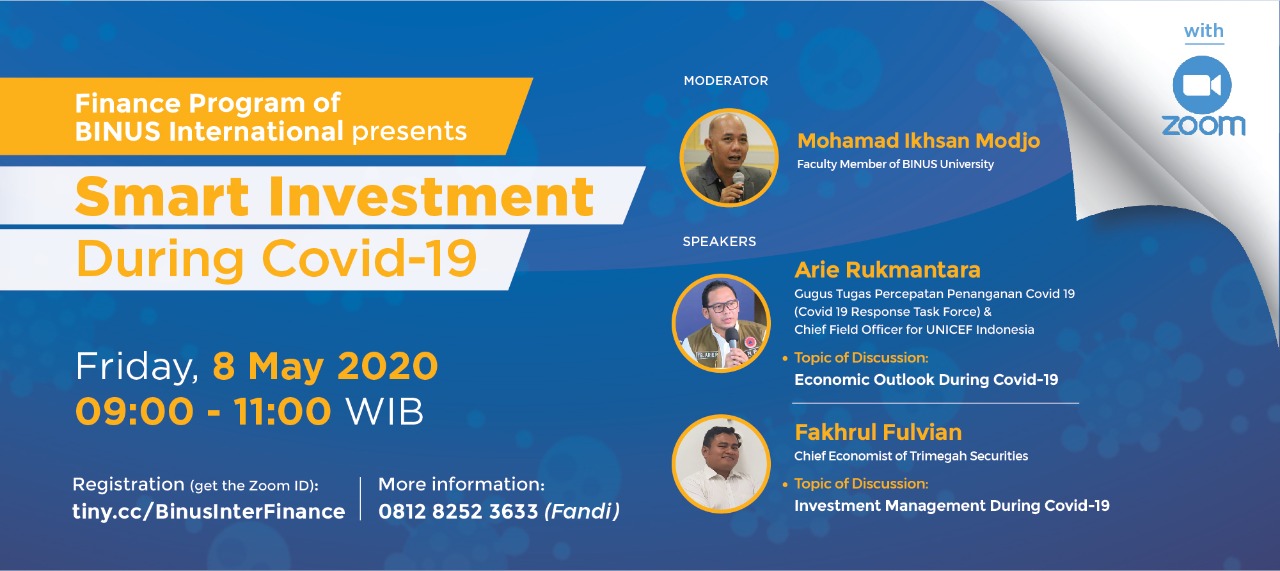Smart Investment During Covid-19

Up until now, the world is still battling against the coronavirus pandemic, which is affecting almost every aspect of our lives. On 8 May 2020, our program conducted a seminar via Zoom, to discuss how Covid-19 affects the economy and how to manage investment during this time. We invited two prominent speakers: Arie Rukmantara, who is the member of Gugus Tugas Percepatan Penanganan Covid-19 (Covid-19 Response Task Force) and Chief Field Officer for UNICEF Indonesia and Fakhrul Fulvian, who is the Chief Economist of Trimegah Securities. Approximately 230 participants attended this webinar, which was open to public as well.
Downloads
Arie Rukmantara’s presentation
Fakhrul Fulvian’s presentation
Watch
Keypoints
1. In the past, several other pandemics had also taken place, each with their own characteristics and dynamics. We should learn from the past to deal with present situation, all of the pandemics rely on how quickly we optimize the opportunity to mitigate them, and there is no essence on doing the same thing over and over again. At present, the focus is on 4Ts:
- Tract: perform tracing/ tracking
- Test: perform testing, government has expanded the facilities to do so
- Treat: put people in health facilities, many people have applied independent isolation as well
- Trim movement: apply physical and social distancing to limit the spread of the virus
In the future, online and digital industry will likely dominate the economy. We should invest more in long-term future program and health facility infrastructure.

2. To forecast the performance of financial market, we need to understand 2 things:
- Things already priced in for the next 6-12 months: global recession, Covid-19 to close most of the economy until midst of 2020, global central bank to conduct further monetary easing and cut interest rate to help the economy, pressure on emerging market foreign exchange to intensify, government to widen fiscal deficit and provide fiscal stimulus everywhere in the world, some economic recoveries expected in 2021
- Things likely to change in 6-12 months basis: possible shallower growth recovery after 2020, possible permanent damage in world global supply chain, supply of capital flows to emerging market could be lower and we could have different path to economic recovery, Indonesia current account could record very small deficit (or even surplus) due to slowing economy
3. The Indonesian government has taken several fiscal as well as monetary and financial actions in response to Covid-19. The stimulus is expected not to bring back growth trajectory to its old good situation, but more on preventing market mechanism failure, and shield our real and financial sector from the possible defaults. Different stimulus (i.e. more to the supply or demand side) will yield different result.

4. Some possible structural changes in the world and Indonesia post Covid-19 for corporates include higher investment in IT-related, supply chain diversification going outside China, JIT inventory will no longer be relevant, leverage tend to be lower, tourism and hospitality industry to lose its appeal, agriculture is likely to rise as food security becomes a big issue. For consumers, the tendency to save will increase, demand for durable goods order will be lower, and demand for basic necessities will rise especially healthcare.
5. To conclude, sectors which is related with improving efficiency and high technology will be benefited from current environment. If this efficiency trend continues, source of profit is less likely to come from higher sales growth, lower cost will be the main driver. Interest rate is likely to stay low as long as we are not moving back to inflationary environment. Overall, in deflationary environment, bond market tend to outperform stock market.

(IM)
